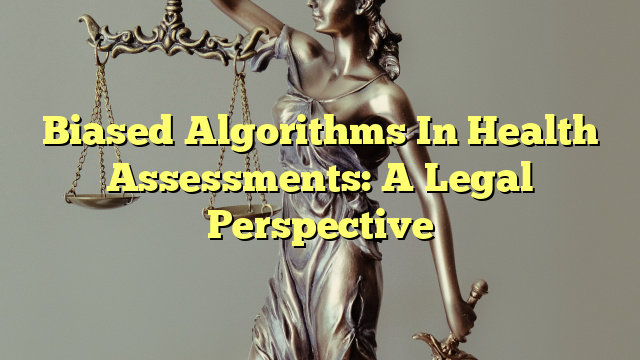Biased Algorithms in Health Assessments: A Legal Perspective
Table of Contents
Legislation for Algorithmic Bias
In recent years, there has been growing concern about the potential bias in algorithms used in various industries, including healthcare. To address this issue, several countries have started implementing legislation to regulate algorithmic bias. For example, the European Union’s General Data Protection Regulation (GDPR) includes provisions that require transparency and accountability in algorithmic decision-making processes. Similarly, the United States has laws such as the Fair Credit Reporting Act (FCRA) and the Equal Credit Opportunity Act (ECOA) that aim to prevent discrimination in credit scoring algorithms.
Bias in Healthcare Algorithms
Healthcare algorithms, which are used to assess and make decisions about patient care, are not immune to bias. These algorithms are often trained on historical data that may contain inherent biases, such as racial or gender disparities in healthcare outcomes. As a result, the algorithms may perpetuate these biases and lead to unequal treatment of patients. For example, a study published in Science found that an algorithm used to determine which patients should receive extra care underestimated the healthcare needs of black patients.
Problems Associated with Biased Algorithms
The use of biased algorithms in healthcare can have several negative consequences. Firstly, it can lead to unequal access to healthcare services, as certain groups may be systematically disadvantaged by the algorithms. Secondly, biased algorithms can perpetuate existing healthcare disparities by reinforcing stereotypes and discriminatory practices. Thirdly, the lack of transparency and accountability in algorithmic decision-making can make it difficult to identify and address instances of bias. Finally, the reliance on algorithms may lead to a loss of human judgment and the devaluation of individual patient experiences.
Example of Algorithmic Discrimination
An example of algorithmic discrimination in healthcare is the case of a predictive algorithm used to identify high-risk patients for complex care management. The algorithm was found to systematically assign higher risk scores to white patients compared to black patients, even when controlling for other factors such as age and health status. This biased algorithm resulted in unequal access to care management resources, with white patients receiving more attention and resources than black patients with similar healthcare needs.

